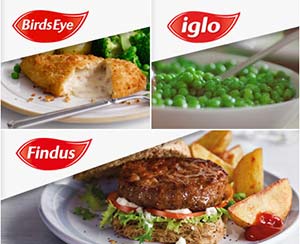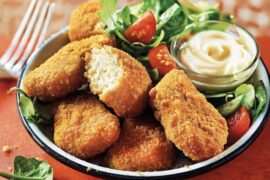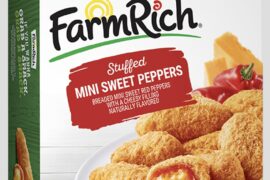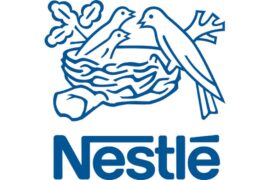The disappointing news from Nomad Foods is that it posted a loss in the second quarter of 2016. However, while overall sales are down year-on-year, the rate of decline continues to be reduced and an after tax profit was realized in the first half of 2016.
“We managed to successfully slow the rate of sales decline for the third successive quarter amidst challenging market conditions and have now halved the rate of decline since the trough in the three months ended September 30, 2015, said CEO Stefan Descheemaeker. “We have maintained margins and cash generation consistent with our internal outlook. As we continue to implement our strategy and our actions start to reach the marketplace through the balance of the year, I am encouraged by our progressive quarterly improvement to the top line trend.”
 Capitalized at over $2 billion, the Feltham, England-headquartered owner of the Birds Eye, Findus and Iglo frozen food brands in Europe has reported that second quarter revenues amounted to €455.9 million, resulting in a €7.3 million loss after tax, which includes exceptional items of €55.1 million.
Capitalized at over $2 billion, the Feltham, England-headquartered owner of the Birds Eye, Findus and Iglo frozen food brands in Europe has reported that second quarter revenues amounted to €455.9 million, resulting in a €7.3 million loss after tax, which includes exceptional items of €55.1 million.
Revenue for the first half of the year was €1,003.0 million, resulting in a €34.9 million profit after tax, which includes exceptional items of €78.2 million.
Descheemaeker informed stock analysts during a recent conference call that the company, which acquired Iglo Foods Holdings Ltd. for €2.6 billion (approximately $2.9 billion) and Findus Group assets in continental Europe for £500 million (about $654 million) during 2015, continues to look for buying opportunities in Europe and beyond.
“There are other categories we should contemplate in North America. I don’t think we should limit ourselves to frozen food because, quite frankly, the frozen food synergies between North America and Europe are quite limited. You have some scale, but that shouldn’t be the criteria,” he commented.
According to a report published by Bloomberg earlier this week, the chief executive officer insists that any additional purchases in Europe will be “very operational, very strategic,” while an acquisition in the United States market, where it is not yet present, would be “more opportunistic.”
During the conference call, he discussed the importance of scale: “I don’t think you can afford to go with something that is too small in the US, because if it’s too small as such it’s probably not starting from the same leading position we had with Iglo. So don’t expect something like a bolt-on in the US, or necessarily something in frozen foods, but expect something that responds to the same criteria that responds to the same criteria we used for Iglo.”
He continued: “What we’ve seen, at least on the bolt-on level, is that there’s a series of potential targets that could be available, I’d say, in the coming quarters or years.”
Second Quarter Results
Meanwhile, here are second quarter performance details:
- Revenue was down €32.1 million, or 6.6%, year-on-year. Adjusting for currency impacts of €12.5 million and the exit from Russia of €1.6 million, the like for like decline was 3.8% – a 2.3% improvement on the rate of decline in the first quarter of 2016. As has been the case in the past few quarters, the drop in sales was primarily attributed to results in the company’s three largest markets: the UK, Italy and to a lesser extent Germany. However, figures in each of these countries again reflected reduced rates of decline year-on-year compared to the prior quarter.
- Gross Profit declined €8.8 million compared to the Pro Forma As Adjusted Gross Profit, driven mainly by lower sales volumes and product mix partially offset by favorable pricing impacts.
- Gross Profit Margin improved by 0.2% compared to the Pro Forma As Adjusted Gross Profit Margin, driven by favorable pricing impacts, improved trade terms management and a reduction in input costs.
- As Adjusted EBITDA for the three months ended June 30, 2016 improved by €5.0 million to €77.9 million, representing 17.1% of revenues. This was due to the reduction in Gross Profit as discussed above, offset by €12.1 million lower advertising and promotion investment as the company re-phased advertising spend to align with the anticipated launch of new advertising campaigns in the second half of the year and €2.1 million lower year-on-year indirect costs as a result of synergy realization and benefits from the company’s lean reorganization program.
- As Adjusted Earnings per Share increased by 1 Euro cent year-on-year, due to the increase in As Adjusted Profit for the period.
Nomad Foods shares, which trade on the New York Stock Exchange, were priced at $11.63 when this story was filed on the afternoon of August 31. For the year its 52-week high was $20.50 and the low was $6.40.
Noam Gottesman, Nomad Foods’ co-chairman, in a statement on August 25 issued in support of the company’s executive leadership, commented: “We believe that Stéfan and the whole Nomad Foods team have identified the correct strategy and are making the right decisions. There are encouraging indicators in ‘Must Win Battles’ [such as in the fish fingers segment in Germany, where sales rose 22% in Q2] and in and we are pleased with our progress to date. Our immediate priority remains stabilizing our top line and further improving our strong foundation to support long-term value creation.”
Gottesman founded the company with Martin Franklin as an investment vehicle without operational business in April of 2014. William Ackman’s Pershing Square Capital Management hedge fund company has an 18.3% in Nomad Foods, which has reportedly dropped in value to approximately $370 million over the past year.
Executive Departures
On the management front, it was reported earlier this month that Achim Eichenlaub has left his posts as Nomad Foods’ managing director for Continental Europe and member of the executive board to become chief executive officer of Regal Springs, a producer of farm-raised tilapia. It has also been announced that Andy Weston-Webb, the company’s chief commercial officer, will step down in October.





